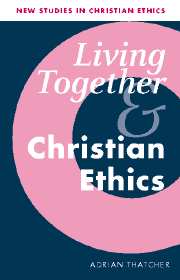Book contents
- Frontmatter
- Contents
- General editor's preface
- Acknowledgments
- PART 1 LIVING TOGETHER AS A THEOLOGICAL PROBLEM
- PART 2 AN EXERCISE IN RETRIEVAL: BRINGING BACK BETROTHAL
- PART 3 EXTENDING THE MARITAL NORM
- 7 Betrothal, consent and consummation
- 8 The sacramental beginning of marriage
- 9 Extending the marital norm
- Appendix: A Rite of Betrothal before Marriage
- Bibliography
- Index
8 - The sacramental beginning of marriage
Published online by Cambridge University Press: 04 August 2010
- Frontmatter
- Contents
- General editor's preface
- Acknowledgments
- PART 1 LIVING TOGETHER AS A THEOLOGICAL PROBLEM
- PART 2 AN EXERCISE IN RETRIEVAL: BRINGING BACK BETROTHAL
- PART 3 EXTENDING THE MARITAL NORM
- 7 Betrothal, consent and consummation
- 8 The sacramental beginning of marriage
- 9 Extending the marital norm
- Appendix: A Rite of Betrothal before Marriage
- Bibliography
- Index
Summary
The present chapter builds on the ground prepared in chapter 3. It advocates the betrothal solution to the pastoral problem of prenuptial cohabitation and to the theological problem of when marriage begins. The idea of a ‘catechumenate for marriage’ is examined. Two Roman Catholic treatments of this idea are considered, but found to have suffered from the hardening of Tridentine orthodoxy and a disowning of more imaginative medieval solutions (first and second sections). In the course of the examination, a further deficit of Tridentine insistence upon consent and consummation before a marriage becomes a sacrament looms into view: the marital history of couples prior to the solemnization of marriage is void of (marital) sacramental significance. An alternative proposal, based on betrothal as a beginning of marriage, is urged. This proposal is at least as equally congruent with tradition as its rival. It avoids the haemorrhaging of sacramental meaning found in the new complacent orthodoxy, and it avoids the mistaken hallowing of engagement (second section). Kenneth Stevenson's work on betrothal, together with a re-appropriation of the idea of liminality encountered in the first two sections, clinches the case for betrothal as the sacramental beginning of marriage (third section). In the fourth section that case is concluded.
A CATECHUMENATE FOR MARRIAGE?
Can there, should there, be a ‘catechumenate’ for marriage? I argue ‘Yes’, and begin the argument with a definition of terms. A ‘catechumen’ is a person who receives instruction in the Christian religion in order to be baptized.
- Type
- Chapter
- Information
- Living Together and Christian Ethics , pp. 237 - 263Publisher: Cambridge University PressPrint publication year: 2002

